

The Journal of Speculative Philosophy, Vol. 18, No. 2 (April, 1884), pp. 162-174. Skip to Main Content Click to Show/Hide Navigation You are not currently logged in through a participating institution or individual account.
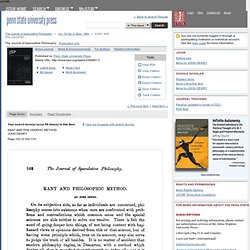
See the login page for more information. Google Scholar Journal Tracking Rights and Permissions for more information about the penn state press, please visit our website: For pricing and ordering information, please contact our subscription services at the Johns Hopkins University Press: 1-800-548-1784 (U.S. and Canada) 1-410-516-6987 (International) jrnlcirc@press.jhu.edu Journal of Speculative Philosophy Order Form To order reprints of Penn State Press journal articles, click here. « Back to Search Results The Journal of Speculative Philosophy Publication Info Published by: Penn State University Press.
The Journal of Speculative Philosophy, Vol. 18, No. 2 (April, 1884), pp. 162-174. What is Enlightenment? by Focault. Today when a periodical asks its readers a question, it does so in order to collect opinions on some subject about which everyone has an opinion already; there is not much likelihood of learning anything new.
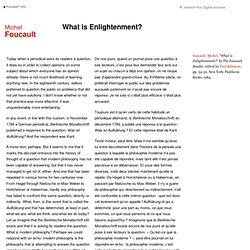
In the eighteenth century, editors preferred to question the public on problems that did not yet have solutions. I don't know whether or not that practice was more effective; it was unquestionably more entertaining. In any event, in line with this custom, in November 1784 a German periodical, Berlinische Monatschrift published a response to the question: Was ist Aufklärung? And the respondent was Kant. A minor text, perhaps. Let us linger a few moments over Kant's text.
To this same question, Moses Mendelssohn had also replied in the same journal, just two months earlier. Let us leave Kant's text here. It is also necessary, I think, to underline the relation between this text of Kant's and the other texts he devoted to history. 'What is the Enlightenment?' by Kant. Modern History Sourcebook: Immanuel Kant: What is Enlightenment?
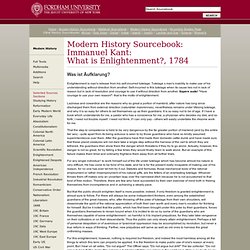
, 1784 Was ist Äufklarung? Enlightenment is man's release from his self-incurred tutelage. Tutelage s man's inability to make use of his understanding without direction from another. Self-incurred is this tutelage when its cause lies not in lack of reason but in lack of resolution and courage to use it without direction from another. Laziness and cowardice are the reasons why so great a portion of mankind, after nature has long since discharged them from external direction (naturaliter maiorennes), nevertheless remains under lifelong tutelage, and why it is so easy for others to set themselves up as their guardians.
That the step to competence is held to be very dangerous by the far greater portion of mankind (and by the entire fair sex) - quite apart from its being arduous is seen to by those guardians who have so kindly assumed superintendence over them. If we are asked , "Do we now live in an enlightened age? " The Postmodernist Critique of the Project of Enlightenment - Sven-Eric Liedman. Why the Enlightenment still matters today. 7 November 2012 Why the EnlightenmentStill Matters Today Professor Justin Champion Modern states are without religious ambitions or obligations.
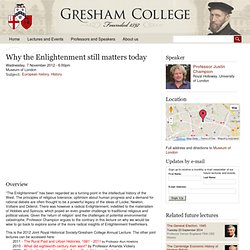
The trouble with the Enlightenment. Like all good liberal intellectuals of the last century, Saul Bellow’s Moses Herzog spent a great deal of time agonising over the legacy of the Enlightenment.
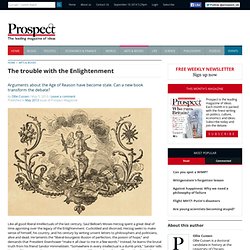
Cuckolded and divorced, Herzog seeks to make sense of himself, his country, and his century by writing unsent letters to philosophers and politicians, alive and dead. He laments the “liberal-bourgeois illusion of perfection, the poison of hope,” and demands that President Eisenhower “make it all clear to me in a few words.” Instead, he learns the brutal truth from his friend Sandor Himmelstein. “Somewhere in every intellectual is a dumb prick,” Sandor tells Herzog. “You guys can’t answer your own questions… What good are these effing eggheads! Ascent of Man.
On 11th august, hundreds of millions of people, from the Caribbean to the Bay of Bengal, stared skywards to watch the sun go dark.
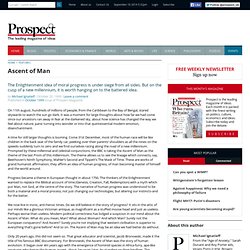
It was a moment for large thoughts-about how far we had come since our ancestors ran away in fear at the darkened sky, about how science has changed the way we feel about nature: panic turning into wonder or into that quintessential modern emotion, disenchantment. A time for still larger thoughts is looming. The Virgin Birth and other myths. The Enlightenment: and Why It Still Matters Anthony PagdenOxford University Press, 501pp, £29 The Crisis of the European Mind 1680-1715 Paul HazardNYRB Classics, 481pp, £12.99 If debating the Enlightenment has become tedious, one reason is that it has produced so many exercises in what old-fashioned religious believers still describe as apologetics – the defence of a pre-existing system of belief.
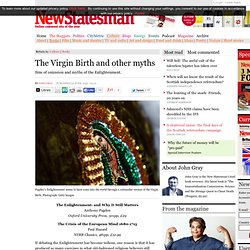
Some of the many recent defences of the Enlightenment are better argued than others. What all of them have in common is that they aim to silence any doubt as to the truth of the creed. Mixing large doses of soothing moral uplift with hectoring attacks on those who wilfully turn their backs on the light, these secular sermons lack the flashes of humour and scepticism that redeem more traditional types of preaching. Adamant certainty is the unvarying tone.